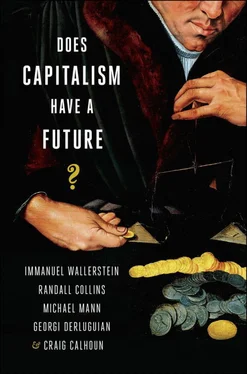Capitalism is not a physical location like royal palace or financial district to be seized by a revolutionary crowd or confronted through an idealistic demonstration. Nor is it merely a set of “sound” policies to be adopted and corrected, as prescribed in the business editorials. It is an old ideological illusion of many liberals and Marxists that capitalism simply equals wage labor in a market economy. Such was the basic belief of the twentieth century, on all sides. We are now dealing with its damaging consequences. Markets and wage labor had existed long before capitalism, and social coordination through markets will almost surely outlive capitalism. Capitalism, we contend, is only a particular historical configuration of markets and state structures where private economic gain by almost any means is the paramount goal and measure of success. A different and more satisfying organization of markets and human society may yet become possible.
Grounds for this claim are in this book and our many prior writings. But for the moment, let us offer a short historical fable. Humans have dreamt about flying since ancient times, at least as long as they dreamt about social justice. For several millennia this was fantasy. Then arrived the age of hot air balloons and dirigibles. For about a century people experimented with these devices. The results, as we know, were mixed or downright disastrous. But now there existed engineers, scientists, and the social structure which supported and stimulated their inventiveness. The breakthrough eventually arrived with new kinds of engines and aluminum wings. We can all fly now. The majority are usually stuck in the cramped budget seats, while only the daring can experience the exhilaration of autonomous flight piloting small airplanes or paragliders. Human flight also brought the horrors of aerial bombardment and hovering drones. Technology proposes but humans dispose. Old dreams may come true although this can also impose on us difficult new choices. Yet optimism is a necessary historical condition for mobilizing emotional energies in a world facing the choice of structurally divergent opportunities. Breakthroughs become possible when enough support and public attention go into thinking and arguing about alternative designs.
1

STRUCTURAL CRISIS, OR WHY CAPITALISTS MAY NO LONGER FIND CAPITALISM REWARDING
Immanuel Wallerstein
My analysis is based on two premises: The first is that capitalism is a system, and that all systems have lives; they are never eternal. The second is that to say that capitalism is a system is to say that it has operated by a specific set of rules during what I believe to be its approximately 500 years of existence, and I shall try to state these rules briefly.
Systems have lives. Ilya Prigogine expressed this succinctly: “We have an age, our civilization has an age, our universe has an age….” [1] Prigogine, The End of Certainty: Time, Chaos, and the New Laws of Nature (New York: Free Press, 1996), 166.
This means, it seems to me, that all systems from the infinitesimally small to the largest that we know (the universe), including the mid-size historical social systems, should be analyzed as consisting of three qualitatively different moments: the moment of coming into existence; their functioning during their “normal” life (the longest moment); the moment of going out of existence (the structural crisis). In this analysis of the existing situation of the modern world-system, the explanation of its coming into existence is not our subject. But the two other moments of life—the rules of capitalism’s functioning during “normal” life, and the modality of its going out of existence—are the central issues before us.
What we are arguing is that, once we have understood what the rules have been that have allowed the modern world-system to operate as a capitalist system, we will understand why it is currently in the terminal stage of structural crisis. We can then suggest how this terminal stage has been operating and is likely to continue to operate for the next 20–40 years.
What are the identifying characteristics, the sine qua non , of capitalism as a system, the modern world-system? Many analysts focus on a single institution that they consider crucial: There is wage labor. Or there is production for exchange and/or for profit. Or there is a class struggle between entrepreneurs/capitalists/bourgeoisie and wage-workers/propertyless proletarians. Or there is a “free” market. None of these definitions of defining characteristics holds much water in my opinion.
The reasons are simple. There has been some wage labor across the world for thousands of years, not only in the modern world. Furthermore, there exists much labor that is not wage labor in the modern world-system. There has been some production for profit across the world for thousands of years. But it has never before been the dominant reality of some historical system. The “free market” is indeed a mantra of the modern world-system, but the markets in the modern world-system have never been free of government regulation or political considerations, nor could they have been. There is indeed a class struggle in the modern world-system, but the bourgeois-proletarian description of the contending classes is far too narrowly framed.
In my view, for a historical system to be considered a capitalist system, the dominant or deciding characteristic must be the persistent search for the endless accumulation of capital—the accumulation of capital in order to accumulate more capital. And for this characteristic to prevail, there must be mechanisms that penalize any actors who seek to operate on the basis of other values or other objectives, such that these nonconforming actors are sooner or later eliminated from the scene, or at least severely hampered in their ability to accumulate significant amounts of capital. All the many institutions of the modern world-system operate to promote, or at least are constrained by the pressure to promote, the endless accumulation of capital.
The priority of accumulating capital in order to accumulate still more capital seems to me a thoroughly irrational objective. To say that it is irrational, in my appreciation of material or substantive rationality (Weber’s materielle Rationalität ), is not to say that it cannot work in the sense of being able to sustain a historical system, at least for a considerable length of time (Weber’s formal rationality). The modern world-system has lasted some 500 years, and in terms of its guiding principle of the endless accumulation of capital it has been extremely successful. However, as we shall argue, the period of its ability to continue to operate on this basis has now come to an end.
CAPITALISM DURING ITS PHASE OF “NORMAL” OPERATION
How has capitalism worked in practice? All systems fluctuate. That is, the machinery of the system constantly deviates from its point of equilibrium. The example of this with which most people are very familiar is the physiology of the human body. We breathe in and then out. We need to breathe in and out. But there are mechanisms within the human body, and within the modern world-system, to bring the operation of the system back to equilibrium, a moving equilibrium to be sure, but an equilibrium. What we think of as the moment of the “normal” operation of a system is the period during which the pressure to return to equilibrium is greater than any pressure to move away from equilibrium.
There are many such mechanisms in the modern world-system. The two most important—most important in the sense that they are most determinant of the historical development of the system—are what I shall call Kondratieff cycles and hegemonic cycles. Here is how each operates.
Читать дальше













